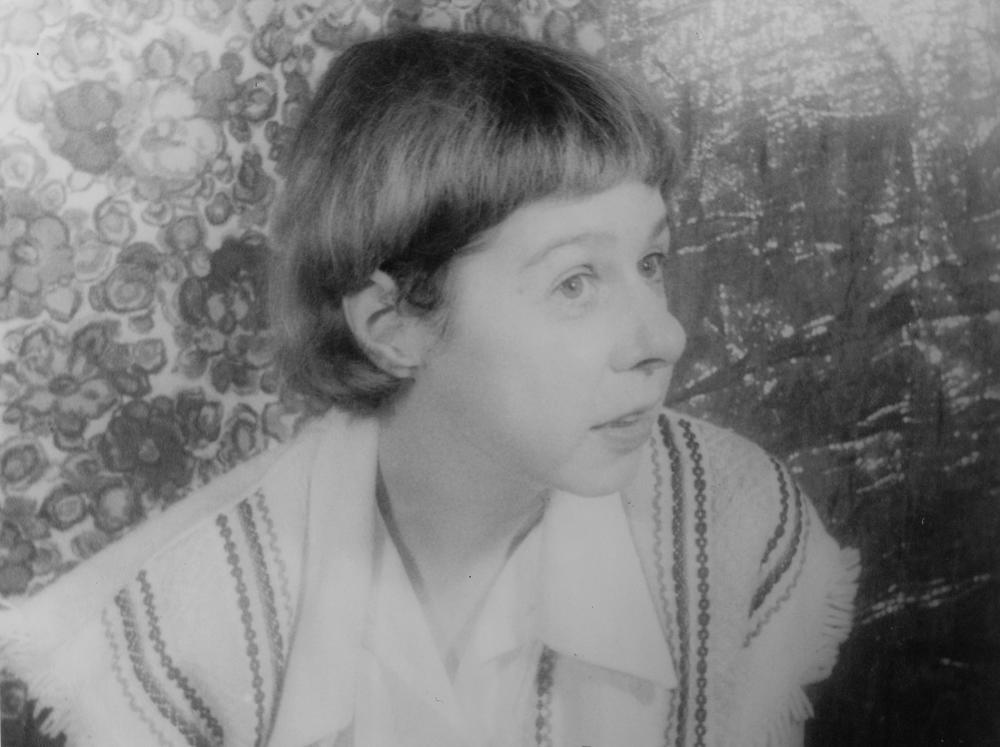
Section Branding
Header Content
Georgia Today: Police disperse protestors at Emory; Black mayor conference; Carson McCullers book
Primary Content
On the Thursday, April 25 edition of Georgia Today: Police disperse protesters at Emory University as campus demonstrations take place across the state; Black mayors from around the country are gathering in Atlanta this week — 50 years since the election of Atlanta’s first Black mayor, Maynard Jackson; and a new book dives into the life and mind of novelist and Columbus native Carson McCullers.

Peter Biello: Welcome to the Georgia Today podcast from GPB News. Today is Thursday, April 25. I'm Peter Biello. On today's episode, police disperse protesters at Emory University as campus demonstrations take place there and across the state. Black mayors from around the country are gathering in Atlanta this week, 50 years since the election of Atlanta's first Black mayor, Maynard Jackson. And a new book dives into the life and mind of novelist and Columbus native Carson McCullers. These stories and more are coming up on this edition of Georgia Today.
Story 1:
Peter Biello: Police have broken up an encampment at Atlanta's Emory University protesting the war in Gaza and ongoing construction at the Atlanta Public Safety Training Center. A statement from the university doesn't say how many people were arrested, only that several dozen people unaffiliated with Emory were trespassing and attempting to disrupt the campus. Emory alum Tiffanie Lanelle Mackey says what started out as a protest of a few dozen people turned into hundreds after the police action.
Tiffanie Lanelle Mackey: They came on campus and began to escalate a peaceful protest, an encampment that was happening on the quad. They started throwing students to the ground, detaining students with zip-ties. They threw tear gas into the crowd and began to collect property, tents and everything.
Peter Biello: There are plans for a counter demonstration at Emory tonight to, quote, "Stop antisemitism." Separately, about three dozen students at Kennesaw State University, north of Atlanta, staged a walkout today. The protests come amid rising campus tensions nationwide after last week's arrest of more than 100 demonstrators at Columbia University in New York.

Story 2:
Peter Biello: As manatees and sea turtles make their springtime appearances in Georgia waters, the Georgia Department of Natural Resources is asking boaters to be cautious. GPB's Devon Zwald reports.
Devon Zwald: Boat injuries are a leading cause of death in manatee and sea turtles in Georgia, says Jessica Thompson with Georgia DNR. She says the protected species spend time in coastal estuaries, tidal rivers and creeks.
Jessica Thompson: So they are essential parts of our ecosystem. And once we get into all the food webs and how our estuaries work, all of these species are really integrated and a part of this huge system that we — we depend on for our food sources, for the health of our rivers.
Devon Zwald: To avoid hitting manatees and sea turtles, Thompson says drive slowly and have a designated lookout. To avoid propeller injuries, she says, look around the boat before even turning on the motor. She says if a boater injures one of these animals to call DNR for help. For GPB News, I'm Devon Zwald.
Story 3:
Peter Biello: Black mayors from around the country are gathering in Atlanta this week. Amanda Andrews reports the African American Mayors Association is set to discuss key policy issues and two major anniversaries.
Amanda Andrews: This year marks 50 years since the election of Atlanta's first black mayor, Maynard Jackson, and 10 years since the African-American Mayors Association was founded. Hundreds of the country's Black mayors, representing over 25 million people, are in town for the event. Miramar, Fla., Mayor Wayne Messam says the conference is in Atlanta this year because they can't move forward without honoring the past.
Wayne Messam: You knew about Maynard Jackson. You knew that he was the first large-scale mayor that any one of us knew. And quite frankly, he was the father of affirmative action. Yes, he, along with other civil rights leaders, are the reason why we all stand here today, many of us "first."
Amanda Andrews: The conference will conclude on Saturday with panels on voting rights, homelessness, education and criminal justice. For GPB News, I'm Amanda Andrews.
Story 4:
Peter Biello: As election season heats up, a Georgia group on Wednesday launched the Educators for Biden-Harris campaign initiative. GPB's Sarah Kallis has more.
Sarah Kallis: The Coalition of Teachers and Advocates join the campaign to try to engage fellow educators to vote for President Joe Biden in November, ahead of the presidential election, and likely run against former President Donald Trump. State Sen. Jason Estevez, a former Atlanta Public School board member, credits Biden with helping teachers through loan forgiveness and valuing their work.
Jason Estevez: The state of public education is one that needs someone in the White House that will advocate for educators and will advocate for our public education system, and that choice is clear with President Joe Biden.
Sarah Kallis: Estevez said the coalition will start hosting mobilization efforts, including recruiting more teachers and phone banking ahead of the election. For GPB News, I'm Sarah Kallis in Atlanta.
Story 5:
Peter Biello: Authorities are investigating an officer-involved killing of a state prisoner in Middle Georgia. The Georgia Bureau of Investigation says 31-year-old Jacob Henson was fatally shot late Tuesday at a hospital near Washington State Prison. The agency says Henson was stabbed in a fight with another prisoner and taken to the hospital for treatment. GBI says at the hospital, Henson and a guard got into a fight which led to the guard shooting Henson.
Story 6:
Peter Biello: The life of Organized Noize producer and hip hop pioneer Rico Wade will be celebrated tomorrow at Ebenezer Baptist Church in Atlanta. Wade died April 13 at the age of 52. His cause of death is unknown. The private, invitation-only service is for family and friends following the service. A funeral procession will include a few stops at landmarks that played a crucial role in Wade's legacy. Wade was a founding member of the Dungeon Family. His music launched the careers of some of the most well-known Atlanta rappers.

Story 7:
Peter Biello: With her first novel, The Heart Is a Lonely Hunter, Columbus, Ga. native Carson McCullers became a literary superstar in 1940, and her stardom never faded as recently as a decade ago. That novel was a selection in Oprah's Book Club, sending her work once more to the bestseller lists. Over the course of her life, she wrote novels, short stories and plays, but she was to some extent held back by illness, alcohol, and a troubled marriage. Biographer Mary Dearborn's recent book, Carson McCullers: A Life, explores her life and legacy. Mary Dearborn.
Mary Dearborn: Hi. Thanks.
Peter Biello: So what made you want to turn your attention to Carson McCullers? You'd previously written biographies of Ernest Hemingway, Louise Bryant, Peggy Guggenheim, Henry Miller. Why Carson McCullers?
Mary Dearborn: I tend to do these male heavy-hitter novelists like Henry Miller, Norman Mailer, and Ernest Hemingway. But in between, I like to do women writers to get away from the testosterone. And so Carson — I was looking for a female subject, but I've always loved her work. But more immediately, an archive opened up in Columbus, Ga., which is her hometown, that was really extraordinary. And biographers are always on the alert for things like that.
Peter Biello: So what were you hoping to learn that previous biographers may not have been able to, because this wasn't open yet?
Mary Dearborn: Late in life, she began therapy with a woman called Mary Mercer, and — because she had writer's block, she was trying to write her what would be her last novel, Clock Without Hands and was stuck. And she went to Mary Mercer for a brief course of psychotherapy. And one of the extraordinary things that I found at Columbus State: she had nine sessions with Mary Mercer, and for complicated reasons, Carson wanted transcripts made of those sessions. It was something to do with giving up her information.
Peter Biello: They were recorded. They were recorded sessions.
Mary Dearborn: Yes, they were recorded and transcripts were made. And Mary Mercer, after Carson died — They became very close. It was a romantic relationship and they had stopped therapy, needless to say. But, Carson died in 1967, and Mary Mercer lived to be 101 and died in 2013. And when she died, she left all the papers of Carson's that she had, which was roughly half of the total papers. Among those were transcripts of these psychiatric sessions. So Columbus State posted one and it was absolutely extraordinary. And I had already decided that I wanted to work on Carson, but that really sealed the deal.
Peter Biello: Mm.
Mary Dearborn: They're amazing. ... She went over a lot of her past and a lot of what worried her and her present and about her writing, but it was really just the opportunity to look in the head of this incredible, imaginative writer.
Peter Biello: When she was first starting out as a writer and throughout her career, really, she was known as a writer who was interested in misfits and outsiders. And I'm wondering what you could tell us about that. Why do you think she was drawn to that as a subject?
Mary Dearborn: ... Because she was one herself. That's what drew me to her, too. I read The Member of the Wedding first, which is about a 13-year-old tomboy, and that kind of fit the bill for me. And I think we all feel like misfits at some point, if not all the time. But Carson herself, she knew from an early age — she liked a dress as a boy. She eventually took the name Carson. Her real name was Lula Carson Smith. And took the name Carson, which is androgynous, and she knew that she had to get out of Columbus, Ga., and she wanted to go to New York. She wanted to want to go where she could be a writer, or, more accurately, where she could be among other misfits, which I think is how she saw it, kind of rightly.
Peter Biello: I wanted to ask you a little bit about her personal life, and how it impacted her writing life. Early in her life, she married Reeve McCullers, who was a troubled character to say the least.
Mary Dearborn: Yes.
Peter Biello: He had problems with alcohol.
Mary Dearborn: Yes.
Peter Biello: He struggled with his sexuality. He was bisexual. Definitely pursued relationships with men, but also had a — no small amount of self-hatred because of that. In a way, it seemed.
Mary Dearborn: He did.
Peter Biello: Carson also drank quite a bit. And together they could go into these spirals of drinking and drama.
Mary Dearborn: Yes
Peter Biello: And their marriage lasted for a dozen years, with an interval in between where they'd been divorced. What do you think his impact on her writing was? Because he was at least outwardly supportive, but quite a distraction otherwise.
Mary Dearborn: I think he was absolutely central. I think, you know, for all Reeve's problems, and I came to really like him a lot. And there's — I wish that we knew more about him, and I wish that he had left more writing because he didn't. He left just— all that we have are his letters to Carson during World War II, when he was in Europe. And they are amazing. He, he was an excellent writer, and he found all kinds of different ways to tell her that he loved her. They're very moving, and I don't mean just finding synonyms for [it]. But he loved the way her mind worked, and he would describe it for her. But he just loved her totally. And Carson responded to that, which is a lucky thing. But she was mostly oriented toward women. One thing that [was] disturbing, but a little funny about them is he called her women that she was interested in "imaginary friends." But Reeves was indeed troubled and the marriage was rocky, and they divorced, and then they remarried, which I think shows an intentionality about being married that she was looking for even though she was a lesbian. You don't give up on somebody who loves you more than anyone else in the world. But he was so troubled and things really went downhill. And he eventually killed himself.
Peter Biello: That's Mary Dearborn, author of Carson McCullers: A Life. After her husband died, Carson McCullers found her health worsening and alcohol playing a greater role in her daily life. But she still worked, producing plays and even a novel meant to comment on racism in the changing American South. In the second half of our conversation, we'll talk about those parts of her life, as well as her deep need for love and attention. That's tomorrow on the Georgia Today podcast.

Story 8:
Peter Biello: For most of last night's game between the Braves and the Miami Marlins, the Braves maintained a two-run lead. Then in the ninth inning, they brought in Rachel Iglesias, who's known for closing up games with tight margins. And somehow, under Iggy's watch, things started to unravel. He gave up three singles in a row. Two runs scored, one on an error, before the Braves defense could end the inning. The Braves went into the bottom of the ninth with a tie and couldn't break it Into extra innings the game went. A.J. Minter came in to pitch for the Braves and delivered something of a masterclass in performing under pressure, relying on both good defense and a key strikeout to get through the inning without giving up a run. And then in the bottom of the 10th, with Ronald Acuña Jr. starting the inning on second, center fielder Michael Harris II drove him home with a hit to left center. Final score: 4 to 3, the three-game series officially a sweep. Speaking after the game, Harris said he felt comfortable facing Tanner Scott, Miami's closing pitcher.
Michael Harris: I faced him in the past a few times, and I know he likes his fastball. I like his fastball, too. So, there's times where I've kind of got him first pitch and just work hard counts against him. So I knew I felt pretty good against him. And if I got my pitch to hit, I had to hit it.
Peter Biello: A walk-off hit is a dramatic way to end the game, and it could overshadow something worth noting about the Braves going forward. Just how good a starting pitcher Reynaldo Lopez is. He went seven innings and gave up one run, struck out three, and gave up only one walk. Catcher Chadwick Tromp was behind the plate for Lopez. Tromp said Lopez was impressive.
Chadwick Tromp: Seven innings. That's — that's pretty good, man. That's — that's high quality start right there for us. He had all his pitches working. Was composed throughout the whole game, really. Yeah, man, he threw the ball real well.
Peter Biello: Starting pitching has been a concern since Spencer Strider fell out of the rotation with an elbow injury. For Braves fans, Lopez is coming in clutch. The Braves had the day off today before starting a three-game series against the Cleveland Guardians at home tomorrow. Ozzie Albies, who has been on the injured list with a fractured toe, is expected to return to the lineup and Chris Sale is expected to get the start.
Peter Biello: And that's it for this edition of Georgia Today. If you want to learn more about these stories, visit GPB.org/news. And if you haven't subscribed to this podcast yet, I highly recommend you do it now. That way you'll stay current on all the Georgia news, and we will stay current in your podcast feed. And if you've got feedback or a story idea, as always, we'd love to hear from you. Email us. The address is GeorgiaToday@GPB.org. I'm Peter Biello. Thanks for listening. We'll see you tomorrow.
---
For more on these stories and more, go to GPB.org/news



